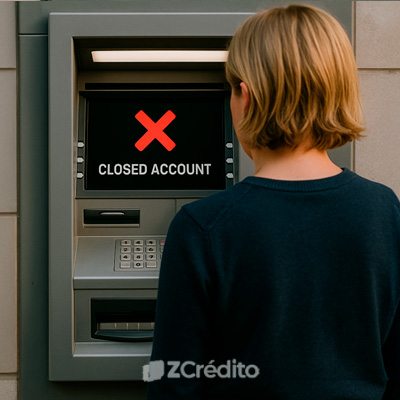Bank Closed Account Without Notice? Here's What to Do If It Happens
Bank closed account without notice? You’re not alone, and you’re not powerless. In recent years, many account holders across the United States have experienced the sudden closure of their bank accounts, sometimes without any warning or clear explanation.
Whether it’s a checking, savings, or even a credit account, banks have the legal right to shut down an account at their discretion. But while the action may be legal, it can create chaos in your financial life if you’re not prepared.
In this guide, we’ll break down why banks close accounts without warning, how it impacts you, what steps you should take immediately, and how to avoid this problem in the future. By the end, you’ll be better equipped to handle such a situation calmly and confidently.
Why Would a Bank Close Your Account Without Notice? 🤔
Understanding why a bank closed an account without notice is the first step toward resolving the issue. Banks can legally terminate a relationship with any customer, and while most do notify account holders in advance, that’s not always the case.
Common Reasons Include:
- Suspicion of Fraud or Illegal Activity: Unusual patterns, large international transfers, or even certain legal but “high-risk” transactions (like crypto or gambling) can trigger internal fraud flags.
- Excessive Overdrafts or Bounced Checks: If your account frequently goes into the negative, the bank may see you as a risk.
- Prolonged Inactivity: Banks sometimes shut down accounts that haven’t had activity in months or years.
- Zero Balance Accounts: An account that consistently maintains a $0 balance could be seen as non-essential or inactive.
- Violation of Bank Policies: Each financial institution has its own internal rules. Violating terms of service, can result in sudden closure.
Even if none of these apply to you, banks aren’t required to give a reason in all cases.
Bank Closed Account Without Notice? Take These Immediate Steps 🔎

If you wake up to find your bank closed your account without notice, there are specific actions you should take immediately to protect your finances.
1. Contact Your Bank Immediately
Call or visit your bank’s branch to ask for an explanation and next steps. While they might not give you full details (especially if the closure is due to fraud suspicion), you should at least be informed of how to access any remaining funds.
2. Retrieve Your Funds
Banks are obligated to return any available balance in the account. This might be through a check, wire transfer, or physical cash withdrawal. Do this quickly to avoid delays, especially if you have bills or rent coming due.
3. Stop Automatic Payments and Deposits
Cancel all linked transactions, including:
- Direct deposits (paychecks, benefits)
- Automatic bill payments (utilities, subscriptions)
- Loan payments or insurance premiums
Missing a payment due to a closed account could lead to penalties or dropped coverage.
4. Check Your ChexSystems Report
Even if your credit score is unaffected, your banking history may now include a negative mark. ChexSystems tracks consumer behavior related to bank accounts. A report here could prevent you from opening a new account elsewhere.
Obtain your free ChexSystems report and check for any inaccuracies or warning signs. If the account was closed by mistake or because of unauthorized activity, you might have the option to challenge it.
Bank Closed Account Without Notice? How It Affects Your Finances 📊
The biggest concern when your bank closed an account without notice is the ripple effect it can have on your broader financial life.
- Interrupted Payments: Missed payments can damage your credit score or result in fees.
- Delayed Paychecks: If your employer doesn’t get the memo, your direct deposit could be rejected or stuck.
- Difficulty Opening New Accounts: Many banks review your banking history before approving a new account. A closure can mark you as “high-risk.”
Some banks may even report suspicious closures to law enforcement or regulatory bodies, though this is rare and usually tied to fraud investigations.
How to Prevent Your Bank From Closing Your Account Without Notice 💳
No one wants to deal with the stress of suddenly losing access to their money. To reduce the risk that your bank closes your account without notice, follow these smart habits:
- Maintain a Positive Balance: Avoid overdrafts and bounced checks.
- Use the Account Regularly: Even small transactions help keep your account active.
- Monitor for Fraud: Check statements and set up alerts to detect unauthorized activity quickly.
- Notify the Bank of Unusual Activity: Large wire transfers or travel can trigger fraud alerts. Give your bank a heads-up when possible.
- Stay Informed: Read the bank’s terms and conditions, especially regarding account closure policies.
Also, consider using a secondary account at another bank or credit union as a backup. This can be a lifesaver if your primary account gets closed.
Now you know what to do if your bank closed an account without notice 🤩
Finding out that your bank closed an account without notice can be shocking and disruptive, but it doesn’t have to be a financial disaster.
By staying calm, taking immediate action, and learning from the experience, you can recover quickly and protect yourself from future issues.
Your financial stability shouldn’t hinge on a single account, and with the right approach, you can stay one step ahead, even when your bank doesn’t warn you.
❓ Frequently Asked Questions
1. Will this affect my credit score?
- Generally, no. Closing a checking or savings account doesn’t directly affect your credit score unless it results in unpaid debts or collections.
2. What if I believe the closure was a mistake?
- Contact your bank and, if needed, file a complaint with the Consumer Financial Protection Bureau (CFPB) or the Office of the Comptroller of the Currency (OCC).
3. How can I check if I’ve been flagged by ChexSystems?
- Visit chexsystems.com to request a free report. You can dispute any inaccurate information.